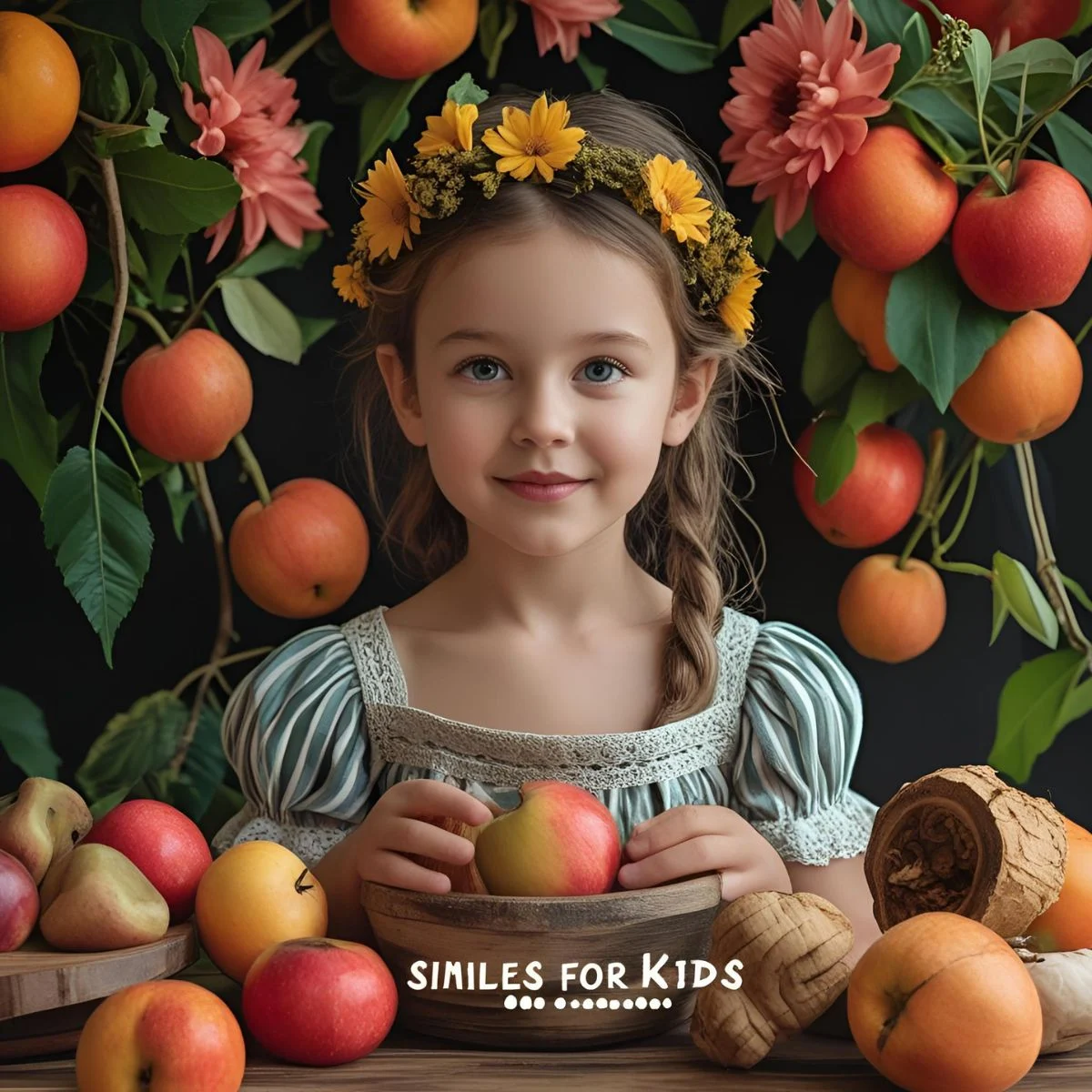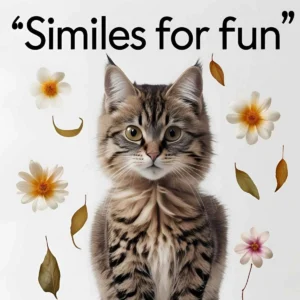Similes Make Poetry Pop! 🦄
Similes are like magic wands, waving “like” or “as” to compare two different things and make words dance with fun. They turn simple ideas into colorful pictures, like saying “She runs fast” into “She runs like a cheetah, zooming across the playground!” For kids, similes make poetry a playful adventure, helping them see the world in new, giggle-worthy ways. Whether scribbling poems, sharing rhymes with friends, or reading at bedtime, similes bring joy to young hearts. Ready to explore? Here’s a poem packed with 25 similes for kids, sorted by theme, to inspire little poets! 📝✨
Poem with Similes for Kids: 25 Playful Comparisons
This poem weaves 25 similes into a kid-friendly narrative, capturing the magic of play, learning, feelings, and dreams. Each simile includes a meaning, a contextual example, and a specific application for young writers, readers, or storytellers. Let’s jump into this poetic playground, organized by themes to spark creativity!
Kids at Play 🎠
Similes for kids running, jumping, and exploring with energy.
- Kids zoom like rockets, blasting through the park.
Meaning: Kids move with explosive speed, like rockets soaring into space.
Example: In a playground scene, “She zoomed like a rocket, racing to the slide.”
Application: Use in a poem about recess or a story about a fun race, e.g., “I zoomed like a rocket to win the game!” - Kids bounce like balls, hopping with glee.
Meaning: Kids are full of lively energy, like balls bouncing on the ground.
Example: In a class skit, “He bounced like a ball, giggling during tag.”
Application: Perfect for a rhyming poem or a caption for a playtime photo. - Kids sparkle like fireflies, glowing in the dusk.
Meaning: Kids shine with excitement, like fireflies lighting up the night.
Example: In a bedtime story, “They sparkled like fireflies, chasing stars in the yard.”
Application: Use in a nighttime poem or a journal about summer fun. - Kids twirl like tops, spinning with joy.
Meaning: Kids move in dizzy circles, like tops whirling on the floor.
Example: In a dance scene, “She twirled like a top, dancing at the party.”
Application: Great for a dance poem or a story about a school talent show. - Kids scamper like squirrels, darting through the grass.
Meaning: Kids run quickly and playfully, like squirrels chasing nuts.
Example: In a park adventure, “He scampered like a squirrel, climbing the jungle gym.”
Application: Use in a nature poem or a tweet about outdoor play.
Kids Learning and Growing 📚
Similes for kids tackling schoolwork or discovering new ideas.
- Kids shine like stars, bright with new facts.
Meaning: Kids light up with knowledge, like stars twinkling in the sky.
Example: In a classroom scene, “Her mind shined like a star, solving the math puzzle.”
Application: Use in a school poem or a parent’s note praising effort, e.g., “You shined like a star on your test!” - Kids grow like sunflowers, reaching for ideas.
Meaning: Kids stretch toward learning, like sunflowers grow toward the sun.
Example: In a science fair story, “He grew like a sunflower, soaking up facts about plants.”
Application: Perfect for a growth-themed poem or a class project reflection. - Kids are sponges, soaking up every lesson.
Meaning: Kids absorb knowledge eagerly, like sponges soak up water.
Example: In a library scene, “She was a sponge, soaking up stories from every book.”
Application: Great for a reading log or a teacher’s classroom newsletter. - Kids bubble like soda, fizzing with questions.
Meaning: Kids overflow with curiosity, like soda bubbles in a glass.
Example: In a class discussion, “His questions bubbled like soda, popping with wonder.”
Application: Use in a curious kid poem or a parent-teacher conference note. - Kids sprout like beans, bursting with new skills.
Meaning: Kids develop quickly, like bean sprouts pushing through soil.
Example: In a music class, “She sprouted like a bean, mastering the recorder.”
Application: Perfect for a poem about learning or a report card comment.
Kids and Their Feelings ❤️
Similes for kids expressing joy, shyness, or bravery.
- Kids giggle like streams, flowing with laughter.
Meaning: Kids laugh freely, like streams ripple with water.
Example: In a family story, “They giggled like streams, splashing joy at the picnic.”
Application: Use in a happy poem or a card for a friend, e.g., “You giggle like a stream!” - Kids are turtles, hiding like shy shells.
Meaning: Kids retreat when nervous, like turtles into their shells.
Example: In a new school story, “He was a turtle, hiding like a shy shell on day one.”
Application: Great for a poem about shyness or a story about making friends. - Kids roar like lions, brave in their hearts.
Meaning: Kids show courage, like lions roaring boldly.
Example: In a sports scene, “She roared like a lion, scoring the winning goal.”
Application: Use in a bravery poem or a pep talk for a school event. - Kids flutter like butterflies, nervous but excited.
Meaning: Kids feel jittery yet eager, like butterflies flapping their wings.
Example: In a play scene, “His heart fluttered like a butterfly before the curtain rose.”
Application: Perfect for a poem about stage fright or a journal about firsts. - Kids are balloons, floating with happy thoughts.
Meaning: Kids rise with joy, like balloons soaring in the sky.
Example: In a birthday story, “They were balloons, floating with giggles at the party.”
Application: Use in a celebration poem or a happy social media post.
Kids in Imaginative Worlds 🌌
Similes for kids dreaming or creating magical stories.
- Kids dream like wizards, casting spells with ideas.
Meaning: Kids imagine wildly, like wizards weaving magic.
Example: In a fantasy tale, “She dreamed like a wizard, crafting a dragon story.”
Application: Great for a fantasy poem or a creative writing assignment. - Kids soar like dragons, flying through stories.
Meaning: Kids dive into imagination, like dragons gliding in tales.
Example: In a bedtime story, “His mind soared like a dragon, exploring a castle in the clouds.”
Application: Use in a magical poem or a storytime journal entry. - Kids sparkle like fairy dust, sprinkling creative ideas.
Meaning: Kids spread creativity, like fairy dust adds magic.
Example: In an art class, “Her drawings sparkled like fairy dust, full of color.”
Application: Perfect for an art poem or a caption for a kid’s artwork. - Kids are pirates, hunting for treasure in books.
Meaning: Kids seek adventure in stories, like pirates chase gold.
Example: In a library scene, “He was a pirate, hunting for treasure in adventure books.”
Application: Use in a reading poem or a librarian’s storytime intro. - Kids weave like spiders, spinning tales with words.
Meaning: Kids create stories, like spiders spin intricate webs.
Example: In a writing club, “She wove like a spider, spinning a tale of talking animals.”
Application: Great for a storytelling poem or a creative writing prompt.
Kids with Cultural Charm 🌍
Similes inspired by cultural or historical kid vibes.
- Kids dance like drummers, tapping to tradition’s beat.
Meaning: Kids move with cultural rhythm, like drummers play heritage songs.
Example: In a festival scene, “They danced like drummers, tapping to the powwow’s beat.”
Application: Use in a cultural poem or a post about a heritage event. - Kids are kites, soaring with festival colors.
Meaning: Kids shine with cultural pride, like kites at a festival.
Example: In a holiday story, “She was a kite, soaring with Diwali’s bright colors.”
Application: Perfect for a poem about holidays or a cultural fair reflection. - Kids sing like flutes, carrying ancient tunes.
Meaning: Kids share cultural songs, like flutes play timeless melodies.
Example: In a music class, “His voice sang like a flute, echoing his grandma’s lullaby.”
Application: Use in a heritage poem or a family storytelling session. - Kids are storytellers, weaving tales like old sages.
Meaning: Kids share stories with wisdom, like sages pass down legends.
Example: In a campfire scene, “They were storytellers, weaving ghost tales like old sages.”
Application: Great for a folklore poem or a scout troop story. - Kids shine like lanterns, glowing with cultural light.
Meaning: Kids reflect heritage, like lanterns glow at festivals.
Example: In a Lunar New Year tale, “Her smile shined like a lantern, bright with family traditions.”
Application: Use in a cultural poem or a card celebrating heritage.
Creative Examples to Inspire Young Poets 🖌️
These similes turn kids’ worlds into a poetic playground. “Kids zoom like rockets” captures the thrill of a race, perfect for a recess rhyme. “Kids are turtles” paints a shy moment, ideal for a story about new friends. Ever thought of yourself as a “pirate” hunting book treasures? Try it in a library poem! Which simile feels like your kid—do they sparkle like fireflies or roar like lions? 🌟
Try This: Pick a simile and write a two-line poem about your day, like “I bounced like a ball at recess today, / Laughing and running in every way!” Share it with a parent or friend.
Practical Applications for Little Wordsmiths ✍️
These similes can make kids’ words shine:
- Poetry: Use “kids shine like stars” in a school poem, e.g., “I shined like a star, learning my ABCs.”
- Stories: Add “kids are pirates” to a library adventure, showing a love for books.
- Class Sharing: Say “We’re balloons, floating with fun!” in a show-and-tell to spread joy.
- Cards or Letters: Write “You giggle like a stream!” in a friend’s birthday card for a smile.
- Social Media: Post “Dancing like drummers at the festival! 🥁” for a cultural event.
Challenge: Rewrite a boring sentence like “I had fun” with a simile, like “I sparkled like a firefly at the party!” Try it in your next school journal.
Conclusion: Let Kids’ Similes Soar! 🚀
Similes are like crayons, coloring kids’ words with fun and imagination. From “rockets” zooming at play to “lanterns” glowing with culture, these comparisons make poems, stories, and chats burst with life. Kids, grab a simile and try it—maybe “I’m a dragon, soaring through my dreams!” in your next rhyme. Parents and teachers, encourage a simile a day! Invent your own, like “I’m a comet, streaking through math!” Share it at dinner or online, and watch creativity fly. Poetry’s a game, and similes are the spark—let’s play! 🌈



